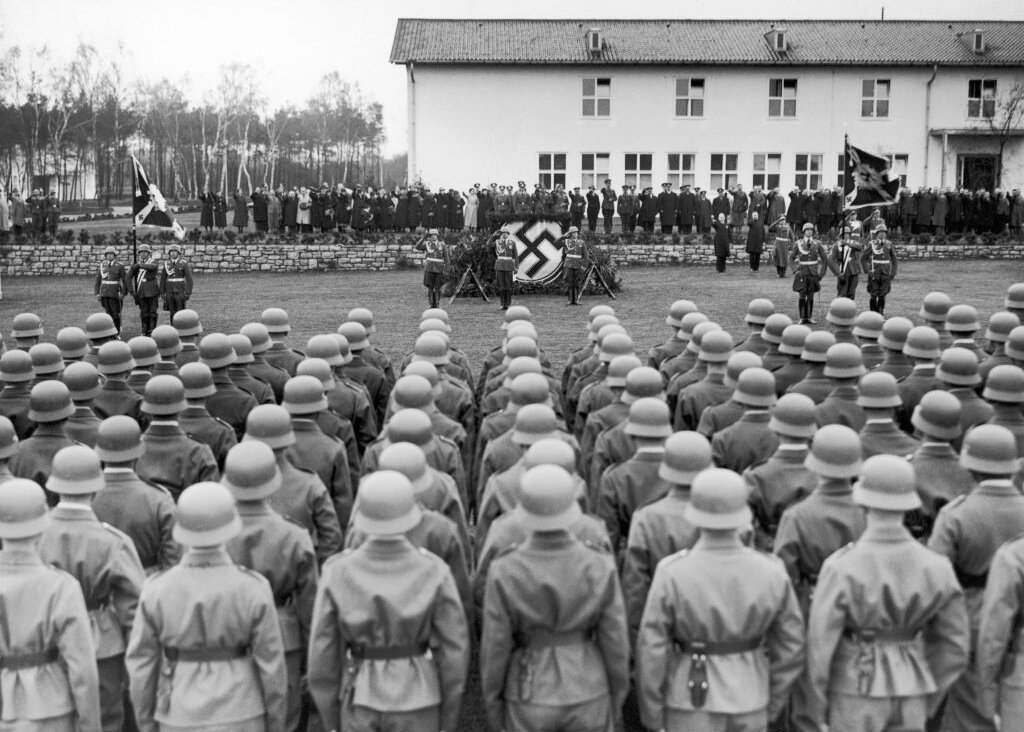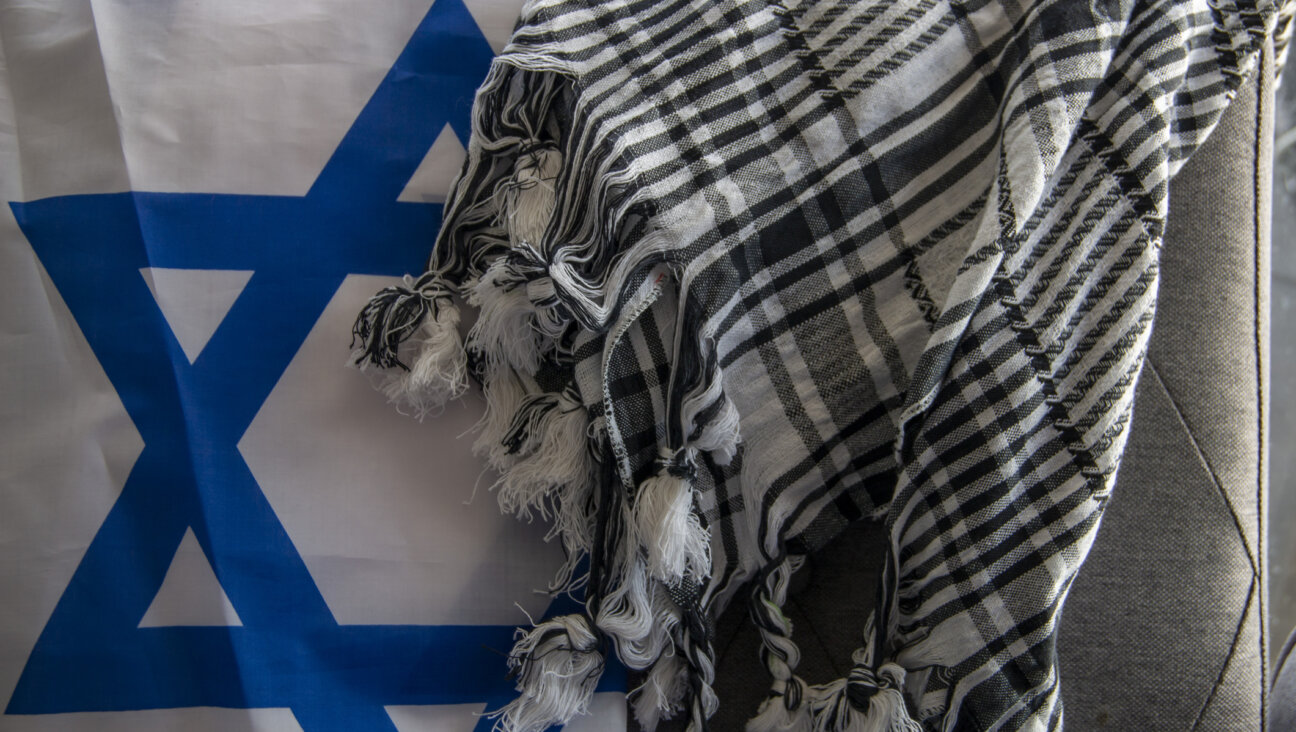Israel Promises ‘Harsh Reaction’ If a Palestinian Cease-Fire Fails
JERUSALEM — Israel is threatening a “harsh reaction” — including the “elimination” of the current Hamas leadership in Gaza and the possible expulsion of Yasser Arafat from Ramallah — if and when the emerging Israeli-Palestinian cease-fire falls apart.
Senior defense officials told the Forward this week that despite widely reported progress in security contacts between Israel and the Palestinians, and among Palestinians themselves, the Israeli defense establishment remains “highly skeptical” of any real change in the situation on the ground or in the Palestinian Authority’s attitude toward terrorism. Defense Minister Shaul Mofaz has stated in private conversations that he has virtually “given up hope” that a cease-fire can hold or that the Palestinian security forces commanded by Mohammed Dahlan, the Palestinian internal security minister, will launch a serious campaign against Hamas terrorists.
Prime Minister Sharon, for his part, appears to be somewhat less negative than his defense establishment. Speaking to the Knesset’s Foreign Affairs and Defense Committee this week, Sharon said that “in private, at least, the Palestinian leaders are resolute in their determination to fight terror, contrary to their public statements.”
These differing estimates came against the backdrop of increasing signs at press time that Hamas was on the verge of agreeing to a hudna, or Islamic cease-fire, for a period of three months. Intelligence officials said that the Hamas leadership had made the decision to accept the cease-fire, but was in the process of trying to negotiate final terms.
In Mofaz’s view, however, Palestinian Prime Minister Mahmoud Abbas, also known as Abu Mazen, may have effectively sealed his fate by declining to accept security responsibility for Gaza in the immediate aftermath of the Aqaba summit. Mofaz believes that since then, Hamas has only strengthened its position in Palestinian public opinion and that Abbas himself, because of his hesitation, has grown steadily weaker.
Israel’s chief of military intelligence, Major General Aharon Farkash-Ze’evi, held talks in Washington this week aimed at proving to administration officials that the Palestinian government “has the means, but lacks the will” to fight the terrorists, Israeli officials said. The defense officials told the Forward that Israel is already “preparing the ground” for “the day after” the probable collapse of the cease-fire, in both the diplomatic and operational arenas. The defense establishment believes that if and when the P.A. proves inept at fighting terrorism, the Bush administration will have no choice but to support an all-out Israeli offensive against Hamas.
In an effort to avert this pessimistic prognosis, which is now conventional wisdom in the top echelons of the Israeli defense establishment, National Security Adviser Condoleezza Rice is expected to warn the Palestinians of the dire consequences that might ensue from a breakdown of the cease-fire. Rice, scheduled to arrive in Israel for her first independent visit on Saturday night, is also expected to press Sharon to continue with the evacuation of “unauthorized outposts” in the territories, in accordance with Sharon’s pledge at the recent Aqaba summit.
Rice is expected to express the administration’s displeasure at the slow pace of the removal of outposts, and to criticize Sharon’s reported exhortation to government ministers, in a recent cabinet meeting, to “keep on building settlements, but to keep quiet about it.” American officials said that Washington is “keeping close track” of the settlement situation in the territories, and that despite its appreciation for Sharon’s political difficulties, in reality there has been only a “slight change” in the situation on the ground.
In an effort to appease the administration, Sharon has ordered a temporary halt to assassination attempts on “political level” Palestinian militants who are not deemed to be “ticking bombs.” Acceding to a request by Secretary of State Colin Powell, Sharon also ordered his chief security negotiator, Major General Amos Gilad, to be “more flexible” in his ongoing talks with Dahlan, the Palestinian security chief, concerning the planned Palestinian takeover of security responsibility in Gaza. The two sides were deadlocked over the Palestinian demand to remove army roadblocks and be given free access along the main north-south artery in Gaza.
The Palestinians have repeatedly put off assuming security responsibility in Gaza, in anticipation of the conclusion of the Egyptian-brokered cease-fire talks between Hamas and the P.A. Palestinian officials consistently express optimism that such an agreement is imminent, but Hamas officials have repeatedly seized on Israeli actions as an excuse not to sign the deal. Thus, this week’s mass arrest by the Israeli army of more than 100 Palestinian militants in Hebron and Nablus was described by Hamas as “an Israeli provocation,” but intelligence officials said this reaction was mostly “tactics and bluster” and that Hamas has already decided to accept the hudna.
Israel, for its part, is being dragged reluctantly into informal acceptance of the Palestinian hudna, at least temporarily, although Israeli officials, including Mofaz, do not expect it to last. The officials believe that Hamas might indeed declare a temporary stop to terrorist activities, but only in order to utilize the time to regroup and rearm.
A handful of officers in the Israeli intelligence community are willing to speculate that a short-term hudna might actually blossom into a protracted cease-fire, especially if Israel reciprocates by gestures of its own, and if the economic situation in the territories significantly improves. Such optimism appears limited, however, to a distinct minority.
The economic factor is exerting a moderating influence on Israel’s own attitude toward the cease-fire. Despite the continuation of terrorist acts and Israeli reprisals, the general optimism generated by the Aqaba summit has improved the economic atmosphere in Israel and raised cautious hopes for an early recovery from the recession of the last two years. Although Finance Minister Benjamin Netanyahu is taking credit for the changed atmospherics, claiming that his recently approved austerity plan has turned the markets around, most analysts believe it is the prospect of political and military calm that is strengthening the shekel against the dollar and reviving the interest of foreign investors in Israel’s high-tech industry.
Israel’s full participation in this week’s economic summit in Amman, held by the Davos World Economic Forum, spread further hopes that economic relief may be on the way. Although Israel was invited to the summit only after intense pressure by the United States, Israeli ministers mingled and met with a host of Arab dignitaries, not only from Egypt and Jordan but from Gulf countries as well. Although Jordan declined Israel’s request to return its ambassador to Tel Aviv, the two countries did announce several new joint economic projects, including negotiations on a free-trade zone and the revival of the decades-old vision of a water canal connecting the Red Sea with the Dead Sea.
Economic and financial figures are thus pressing government ministers, and Sharon personally, to “give peace a chance” and to refrain from military ventures that are not absolutely vital to stopping terrorism. Sources in the Prime Minister’s Office told the Forward that Sharon has been warned that a new outbreak of unabated violence could dash the new hopes for recovery and might have a “devastating effect” on the Israeli economy as a whole.
Despite their fatalistic pessimism on the Palestinian front, Israeli security chiefs are taking heart from the intense American pressure on both Syria and Iran. Mofaz, Israel’s defense minister, said this week that the United States is likely to persevere in its pressure on Damascus to shut down offices of Palestinian terror groups operating out of Damascus, and would then go on to demand that Syria disarm Hezbollah. Israel is also encouraged that Washington has taken a new and tougher tack concerning Iran’s nuclear aspirations, in accordance with Israeli recommendations submitted to the administration even before the outbreak of the war on Iraq.
Mofaz, in private conversations, says that there are signs that both Teheran and Damascus are taking heed of American warnings, both because of the massive American military presence on their borders, and also because of their fear of policies espoused by U.S. Secretary of Defense Donald Rumsfeld. “They don’t know what to make of him,” Mofaz has said, “and they are running scared.”














